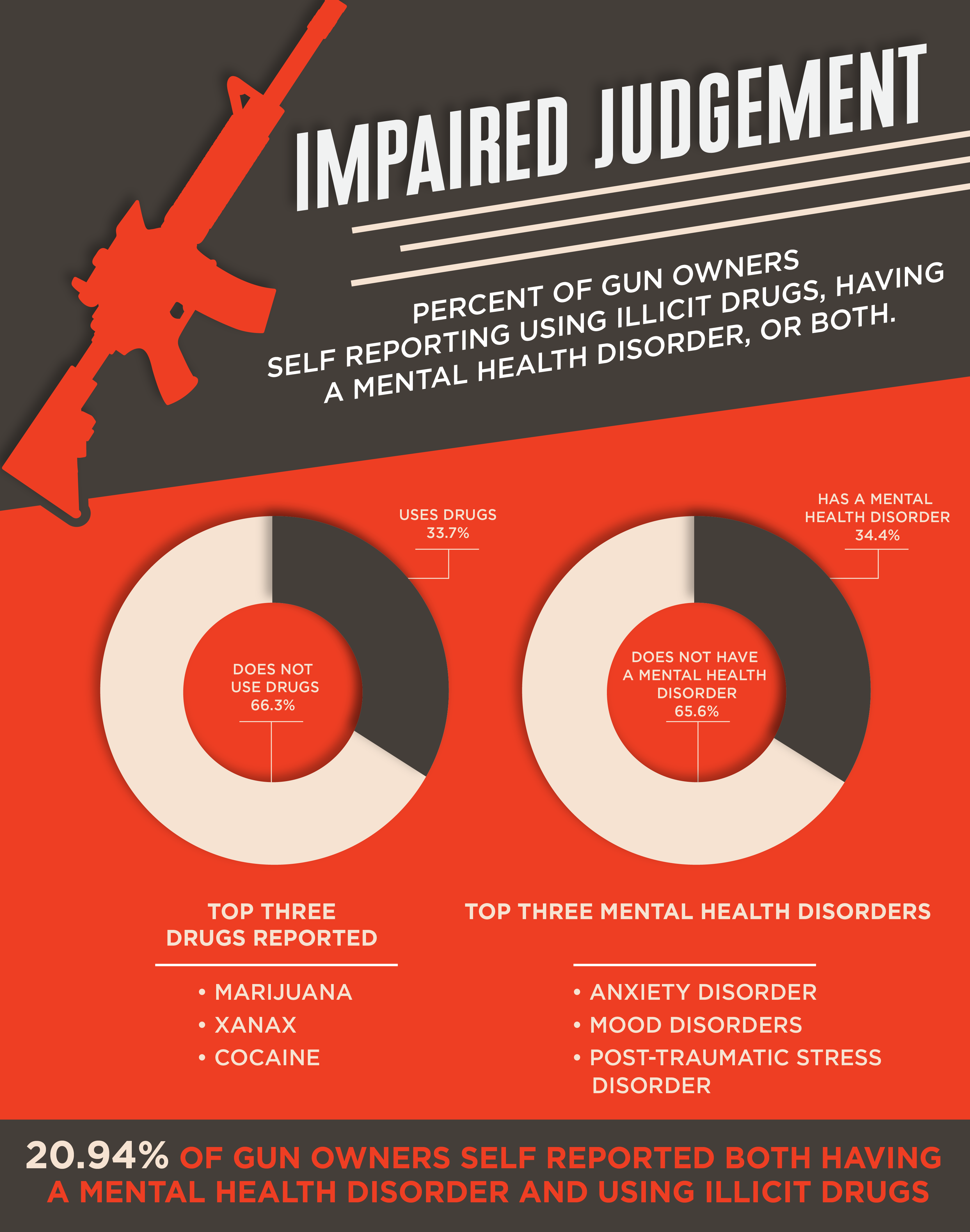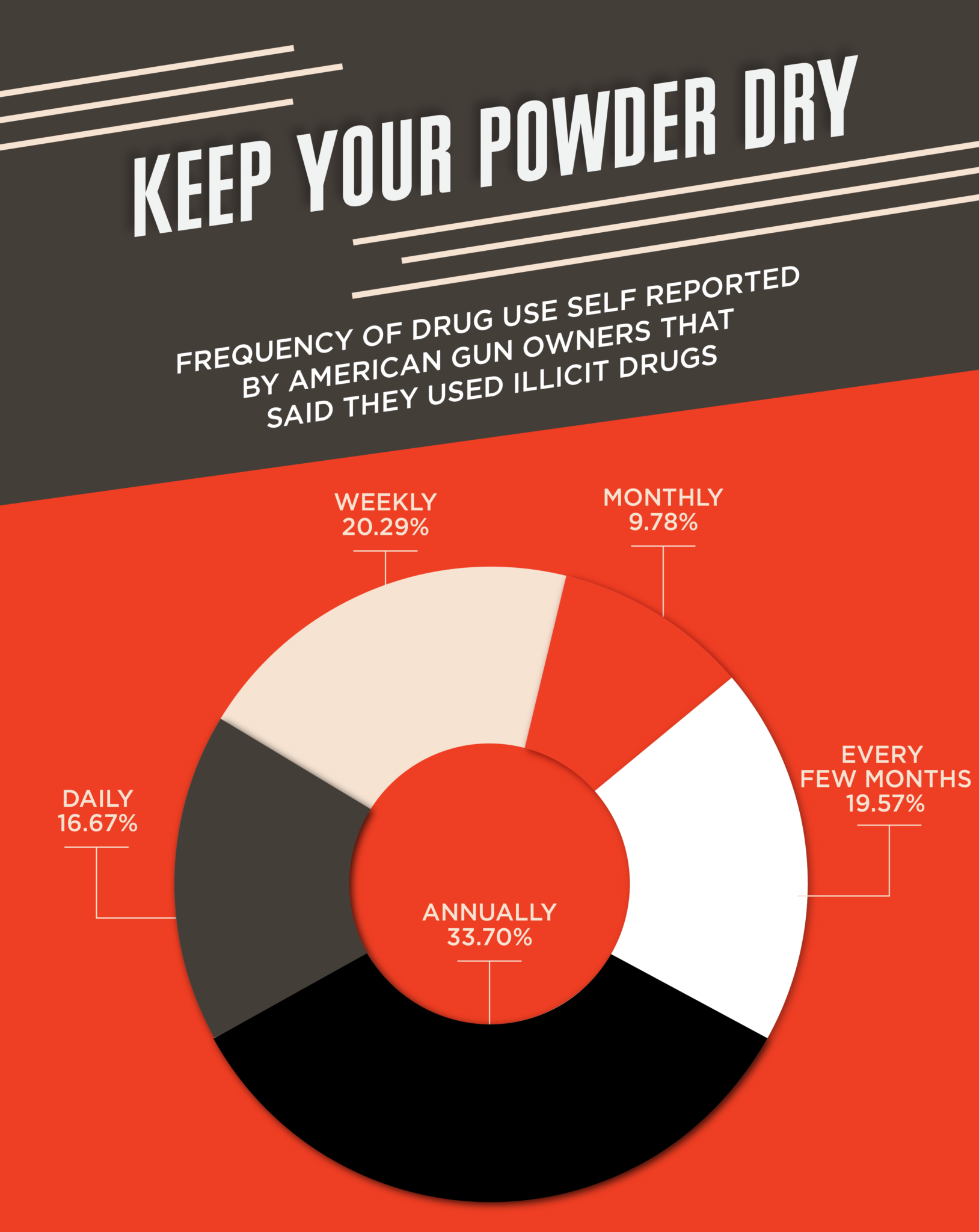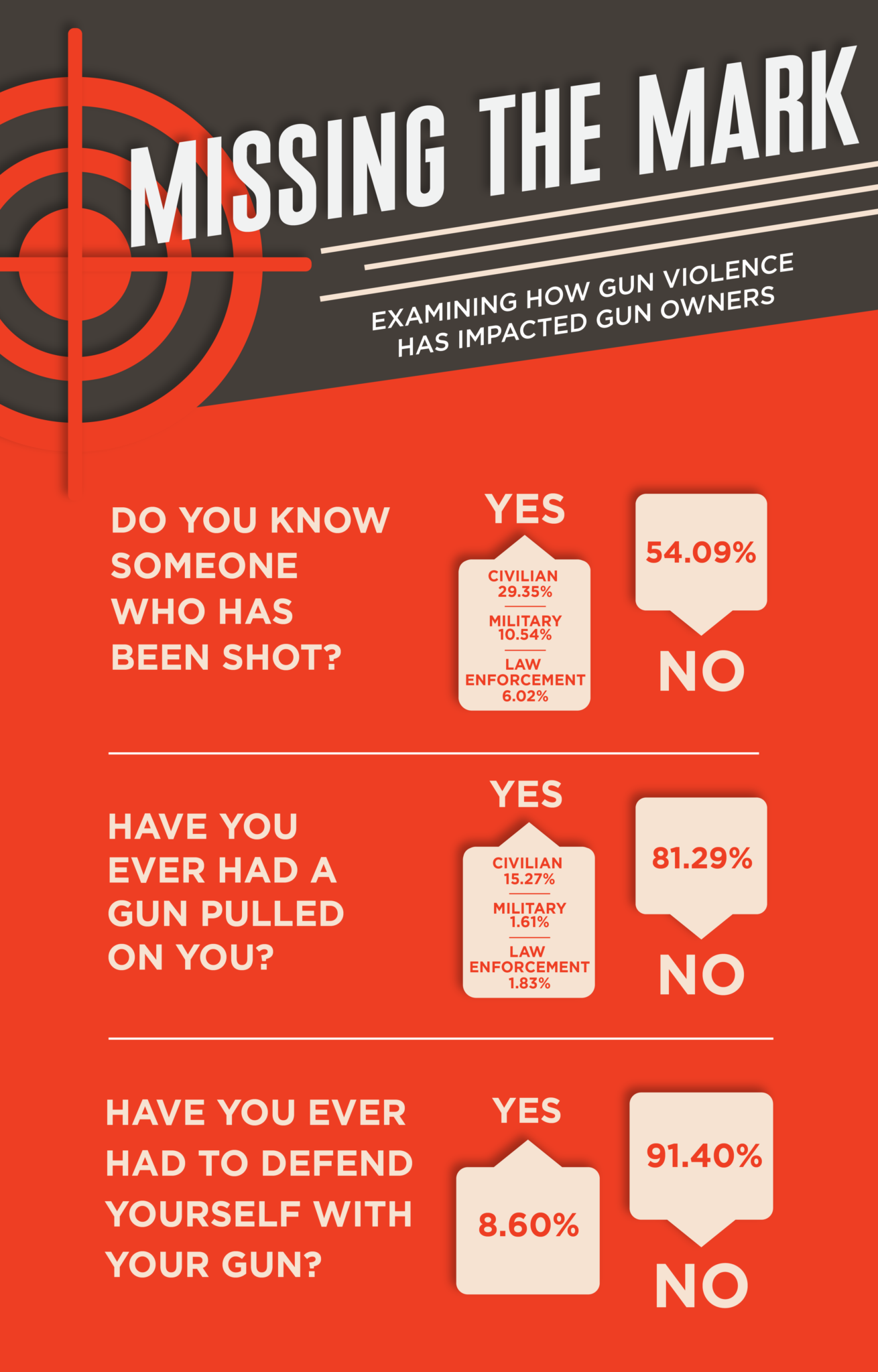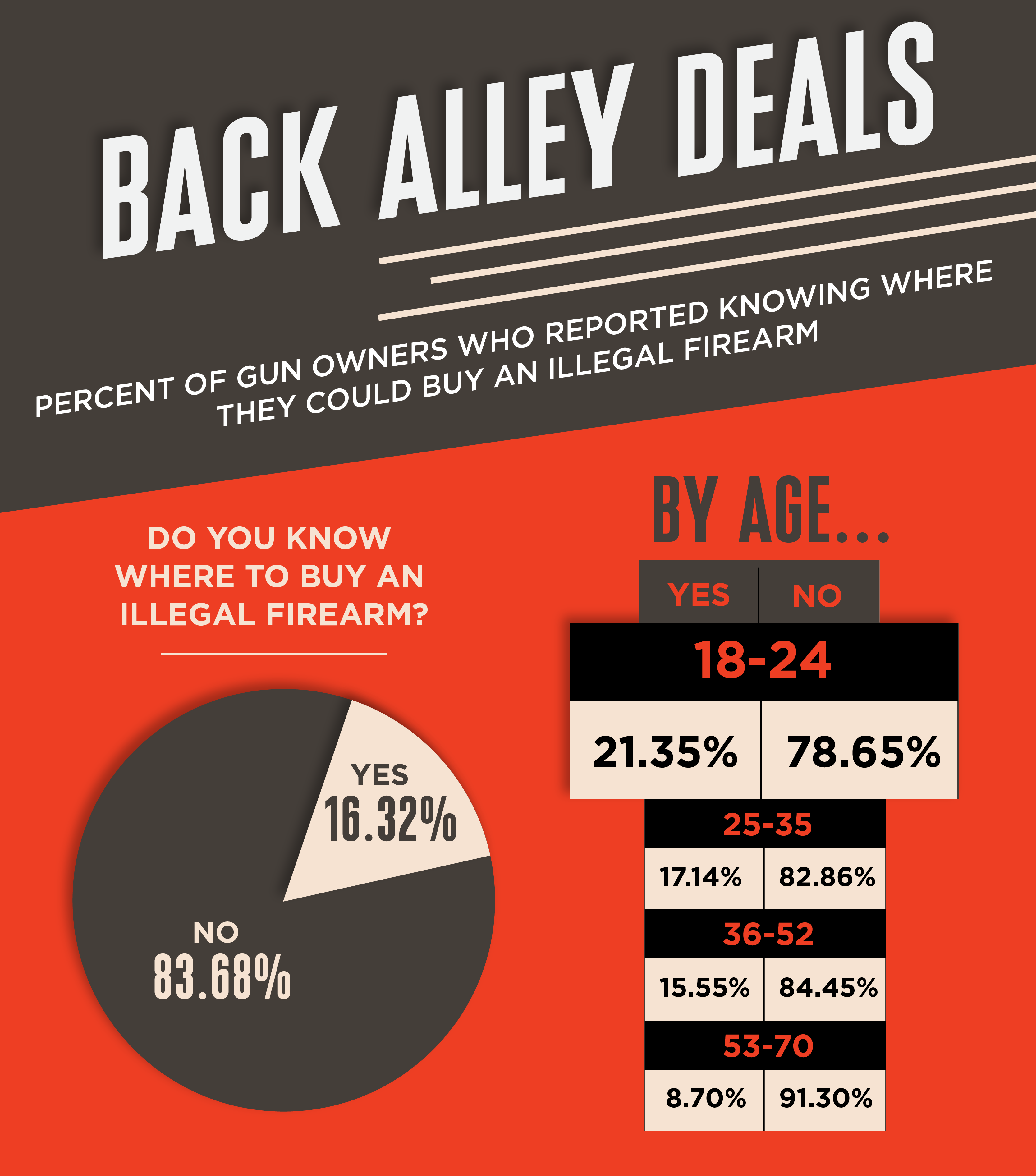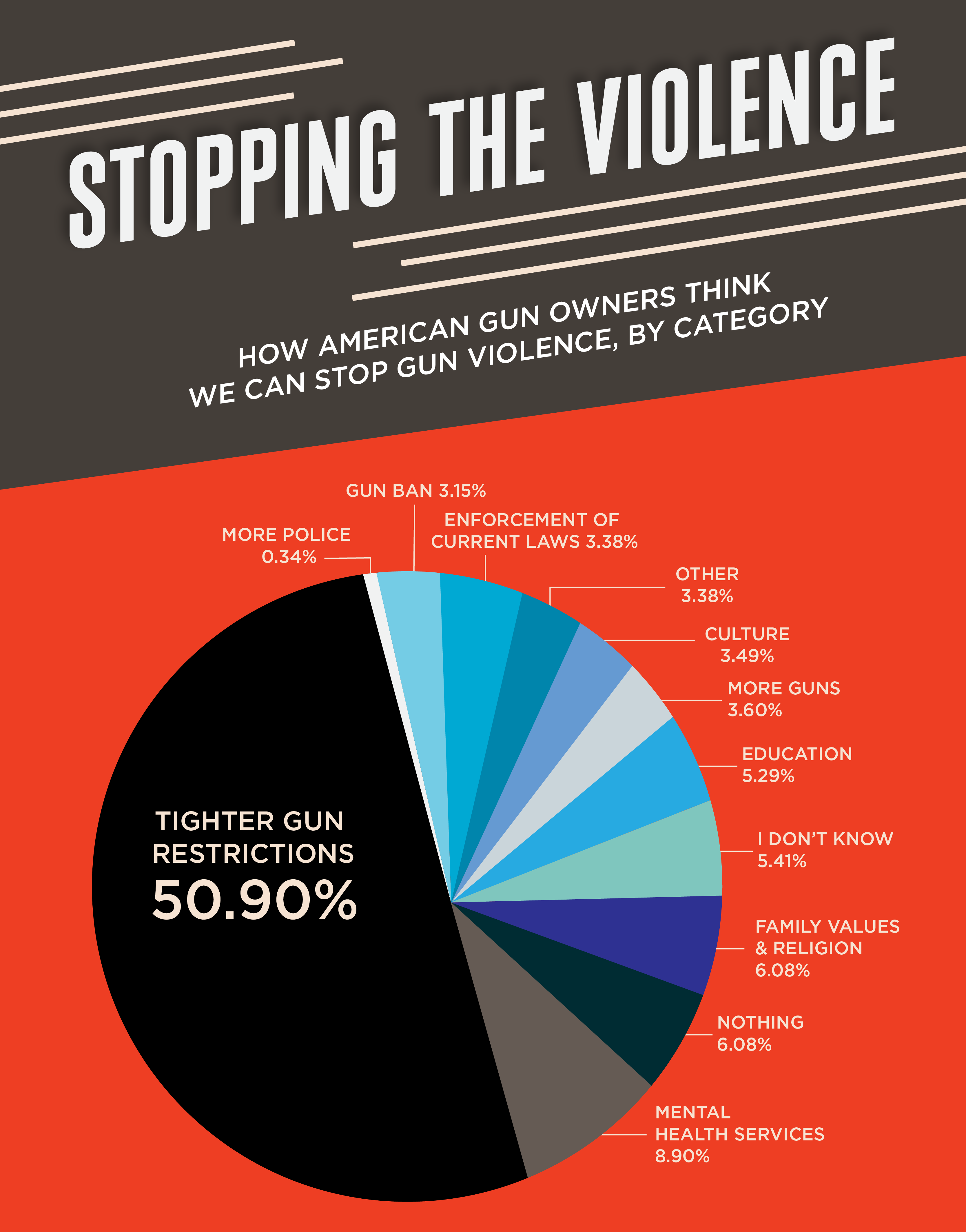
On February 14th, 2018 14 students, one teacher, an athletics director, and an assistant football coach were killed after a 19 year-old gunman entered their school with an AR-15 style semi-automatic weapon.
Despite multiple reports over the years that the gunman, Nikolas Cruz, was suspected by many of being a danger to their community, little was done by city or state officials to help prevent the tragedy. In the immediate wake of the shooting, political conversations aimed at preventing deadly attacks like this one turned to two major talking points: gun reform in America and mental health.
While the debate rages on, we’re taking a first-hand look at gun culture across the county. We surveyed 1,098 self-identified gun owners for their opinions on tighter gun restrictions, how often they practice or train with their weapons, and about their own histories with mental health and drug misuse. Curious how many gun owners know where to purchase weapons illegally or who confessed to a relation between mental health and gun violence? Read on as we explore their responses.
Mental Health and Gun Violence
Of the 1,098 gun owners we polled, more than 1 in 3 self-identified as having a mental disorder. Among the most commonly reported disorders were anxiety (including panic disorder), mood disorders, and post-traumatic stress disorder. Only slightly fewer people (nearly 34 percent) identified themselves as drug users and more than 1 in 5 American gun owners confessed to being both drug users and having a mental disorder. The most commonly consumed substances included marijuana, Xanax, and cocaine.
Experts suggest that decision-making and the function of risk and reward receptors in the brain are skewed among people with mental illness. Those challenges can impact the way they approach their own health and the treatment of their conditions further compounding both recovery and decision quality. For example, children with depression are more likely to anticipate defeat over reward and to avoid actions that might result in positive outcomes.
Gun Ownership and Illicit Drug Use
Querying the self-identified gun owners who confessed to consuming illicit substances, we further asked how often they were using drugs like marijuana, Xanax, and cocaine.
Nearly 17 percent admitted their illicit drug use was a daily occurrence. Even with marijuana (which is legal in various capacities in certain states across the country), long-term effects of regular use can lead to mental health concerns and physical health issues, including chronic cough and frequent respiratory infections. 1 in 5 drug-using gun owners consume illicit substances weekly, and 1 in 10 do so on a monthly basis.
Like marijuana, the short-term effects of cocaine can also lead to mental health concerns including insomnia and anxiety, contributing to violent acts and erratic behavior. While not a universally occurring condition among drug users, drug addiction is considered a chronic and relapsing disease that impacts parts of the brain that control impulsive behavior, memory, and a dependency on these substances.
Gun Violence and its Impact on Gun Owners
A Pew Research study conducted in 2017 revealed more than 2 in 3 gun owners cite self-defense as the primary reason for owning a gun. Hunting, sport shooting, and collecting were also listed as popular reasons why Americans choose to purchase firearms. According to our study, less than nine percent of gun owners have ever had to defend themselves with their guns.
While gun violence did increase across the U.S. between 2014 to 2016 by roughly 32 percent, it remains lower than rates of firearm violence in 1993 when the number of people killed by guns every year was nearly double that of 2016. More than 54 percent of Americans polled did not know a victim of gun violence personally and more than 81 percent had never had a gun pulled on them. Of those who did know someone that had been shot, nearly 17 percent were either people serving in the armed forces or as police officers.
Practicing with Firearms
When it comes to gun ownership, experts suggest untrained gun users can be extremely ineffective at defending themselves with their weapons. Even simple target practice shooting may not be sufficient, and quality practice measures should emulate speed, anxiety, and the pressures of dangerous scenarios.
In reality, more than 23 percent of gun owners in American we polled admitted to never practicing with their weapons while nearly 21 percent only practice once a year. According to one police spokesman and firearms trainer, the way a person shoots at a firing range is one thing, but shooting under pressure or under the effects of adrenaline can be a far different experience.
Only 14 percent of gun owners practice once a month and less than 9 percent practice multiple times each month on average.
Finding Illegal Guns
Despite what you might have seen on TV, where outfitting yourself with black market firearms seems relatively straightforward, most people don’t think they’d know where to buy an illegal firearm. Less than 10 percent of those respondents between 53 and 70 years of age said they knew where they could go to illegally purchase a firearm. It seemingly can be as easy as heading to the ArmsList, a firearms marketplace that allows for private and “mostly unregulated” gun sales.
Perhaps the role of technology in illegal firearm sales is why the youngest respondents – between 18 and 24 years old – felt most confident in being able to acquire a gun off the books. However, it’s a case of intentionally mistaken identity (better known as “straw purchasing”) where someone buys a gun with the intent to provide it or sell it to someone else, where most illegal gun trade occurs.
How Do We Stop Gun Violence?
*Note: Detailed explanation about how we categorized responses included in our methodology.
Perhaps an image of the late Charlton Heston, actor and former president of the National Rifle Association, thrusting a rifle into the air taunting those seeking to enact gun reform and restrictions to take it “from my cold, dead hands,” is how people see gun owners. But that may be the wrong picture – just over 50 percent of gun owners responded that they believe more gun restrictions are the way to help solve the American gun violence epidemic.
This is in line with the 66 percent of all American voters who support stricter gun laws. According to their poll, one of the most popular ideas is universal background checks, with 97 percent of gun owners in favor of these additional processes being implemented.
Finding the Answers
Compared to other developed countries around the world, the U.S. has a very unique problem with gun violence. With more guns in the hands of civilians and more firearm-related homicides than any other country in the world, mass shootings like the one in Parkland, Florida, make up only a small percentage of these deaths. As our study found, the vast majority of gun owners may be ill-equipped to handle these weapons. Many of them had never used a gun to defend themselves and more than half confessed to being in favor of stricter gun resections to help end gun violence in America.
Less than 9 percent of Americans suggested mental health services might help lower the rates of gun violence. However, 1 in 5 gun owners we polled experienced both illicit drug use and self-identified mental disorders. In many cases, these issues are co-occurring and proper diagnosis can help identify the appropriate treatment plans to help reduce their impact and help millions of Americans find mental and physical well-being.
If you or someone you love is suffering from drug addiction or mental illness, FHE Health experience is here to help you on the road to recovery. Including inpatient and outpatient care as well as medical detox, our team of neuroscientists will help identify the exact parts of the brain impacted by addiction to create a truly personalized treatment plan. Take control of your life again with the help you need to fight addiction today. Visit us online today at FHERehab.com to learn more.
Methodology
We surveyed 1,098 American self-reported gun owners. We employed a non-randomized convenience sampling methodology for the recruitment of participants via Amazon’s Mechanical Turk service. Demographic variables reported include ages ranging from 18 to 71, with 55.18% self-identified males and 44.26% self-identified females. All participants were residents of the U.S., representing all states and the District of Columbia.
When asking how to end or reduce gun violence, we grouped responses based on the explanation respondents stated. Tighter gun restrictions included any response calling for any gun restrictions not including total gun bans. Mental health services included any response calling for better mental healthcare. Nothing included respondents writing the word “nothing”, or variations of the phrase. Family values and religion included both advocating for stronger family values as well as a bigger role for religion in society. The “I don’t know” category are all respondents who said they couldn’t come up with a way to fix the issue. Education pertained to respondents asking for better gun education and/or education in schools. More guns include all instances of responses advocating for an increase in gun ownership and availability. Culture consists of all instances of responses advocating for a change in our culture, whether it was music, movies, etc. Enforcement of current laws includes all responses that advocated for keeping gun laws the same but enforcing them stricter. Gun ban included all responses that advocated for completely banning guns. More police included all responses advocating an increase in the police force or presence in certain areas. Others included all responses that could not be categorized into the above.
Sources
- https://www.fastcompany.com/3055187/do-people-really-buy-guns-on-the-dark-web
- https://people.com/crime/march-for-our-lives-march-24-teen-survivors-florida-school-shooting/
- https://www.samhsa.gov/disorders/co-occurring
- https://www.cnn.com/2018/02/15/politics/guns-dont-know-how-many-america/index.html
- https://www.npr.org/2016/01/05/462017461/guns-in-america-by-the-numbers
- https://www.nraila.org/gun-laws/
- https://www.theatlantic.com/politics/archive/2017/06/right-to-carry-gun-violence/531297/
- https://www.cnn.com/2018/02/15/politics/mental-health-gun-possession-explainer/index.html
- https://www.nbcnews.com/news/us-news/social-media-post-led-florida-agency-investigate-nikolas-cruz-2016-n849221
- https://www.drugabuse.gov/drug-topics/commonly-used-drugs-charts#marijuana
- https://www.pewresearch.org/fact-tank/2017/06/22/key-takeaways-on-americans-views-of-guns-and-gun-ownership/
- https://fherehab.com/news/side-effects-of-marijuana-use/
Want To Use Our Study?
Want to use our study? Please feel free! All that we ask is that you include a link back to this page so readers can learn more about the study.
